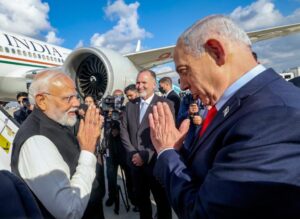“EAM Running ‘Full-Blown Circus’ To Destroy India’s Foreign Policy”

External Affairs Minister S Jaishankar with the Chinese President Xi Jinping. "I guess the Chinese foreign minister will come and apprise PM Modi about recent developments in China–India ties", Congress leader Rahul Gandhi said
On July 15, the Congress party expressed hope that Prime Minister Narendra Modi would finally agree to a discussion on China during the upcoming Monsoon session of Parliament. Congress leaders emphasized that if Parliament could debate the border situation during the 1962 Chinese invasion, there should be no hesitation in addressing the current issues.
Rahul Gandhi, tagging a media report about External Affairs Minister S. Jaishankar’s meeting with Chinese President Xi Jinping, criticized the minister’s approach, stating, “The EAM is now running a full blown circus aimed at destroying India’s foreign policy.” He sarcastically suggested that the Chinese foreign minister might soon come to inform Modi about developments in India-China relations, highlighting the perceived absurdity of the situation.
During a meeting with his counterparts from the Shanghai Cooperation Organization (SCO) member nations, Jaishankar discussed the state of India-China bilateral ties with President Xi. In a meeting with China’s Vice President Han Zheng on July 14, Jaishankar remarked that the relationship “has been steadily improving since the meeting between Prime Minister Modi and President Xi in Kazan last October.” He added that “continued normalisation of our ties can produce mutually beneficial outcomes.”
However, Congress General Secretary Jairam Ramesh pointed out the stark realities of the bilateral relationship since Modi’s last interaction with Xi. He stated, “Perhaps we should remind the EAM of recent developments in bilateral ties since the PM’s last tete-a-tete with President Xi: China gave total support to Pakistan during Operation Sindoor.” Ramesh highlighted that this support turned Pakistan into a testing ground for advanced military systems, including the J-10C fighter and PL-15E air-to-air missiles.
Lt. Gen. Rahul R. Singh, Deputy Chief of Army Staff, noted that India faced three adversaries during Operation Sindoor, including China, which allegedly provided Pakistan with “live inputs,” or real-time intelligence on Indian military operations. Ramesh further warned that Pakistan is likely to acquire Chinese J-35 stealth fighters soon, which could escalate tensions in the region.
Ramesh also raised concerns about China’s restrictions on exports to India of critical materials, including rare-earth magnets, specialty fertilizers, and tunnel-boring machines essential for infrastructure projects. He stated, “Important sectors like telecom, pharmaceuticals, and electronics remain critically dependent on Chinese imports, even as the trade deficit with China reaches a record USD 99.2 billion.”
The Congress leader pointed out that the departure of hundreds of Chinese workers from India’s Foxconn facilities could hinder India’s ambitions to become a global supplier of Apple smartphones. He questioned when the External Affairs Minister and Prime Minister Modi would take the Indian public into confidence and hold a detailed debate on China in Parliament, a call the Congress has been making since 2020.
Ramesh expressed hope that the Prime Minister would finally agree to such a discussion, breaking what he termed a “five-year drought” in Parliamentary discourse on this critical issue. He argued, “If Parliament could debate the border situation in November 1962 when the Chinese invasion was at its peak, why cannot we discuss now, especially given that both sides appear to want renormalisation?”
He emphasized the importance of building a national consensus on the security and economic challenges posed by China’s rise as a global manufacturing power and its position as the second-largest economy, which may soon surpass the United States. Ramesh stated, “It is essential to build a national consensus on the critical security and economic challenges arising from China’s rise.”
At a press conference, Congress spokesperson Supriya Shrinate criticized Jaishankar’s previous statements, including his claim that India is a small economy that cannot confront a larger one. She expressed concern over the lack of accountability regarding the Pahalgam terror attack, stating, “The 28 martyred families continue to await justice, and the question remains: When will the terrorists be brought to justice?”
Shrinate raised questions about how the terrorists managed to infiltrate 200 kilometers into Indian territory, carry out the Pahalgam terror strike, and vanish without a trace. She argued that the lack of accountability and transparency raises more questions than answers.
Additionally, Shrinate targeted the BJP, alleging that Jyoti Malhotra, who was arrested on charges of spying, had claimed to be associated with the Haryana BJP while crossing into Pakistan. She stated, “Investigation revealed she was in contact with Danish, her handler at the Pakistan High Commission, who facilitated her trips to Pakistan.” Shrinate suggested that the BJP’s connections to individuals involved in espionage against India are not isolated incidents.
She posed critical questions regarding the government’s response: “What action has been taken against Jyoti Malhotra? What information has she revealed? What measures are being taken to apprehend the terrorists?” Malhotra was arrested in May this year, following the Pahalgam terror attack, on suspicion of espionage for Pakistan.
The Congress party’s critique of the government’s foreign policy came just a day after Jaishankar emphasized the need for India and China to build on their “good progress” in normalizing bilateral ties to address border-related issues, including de-escalation. He reiterated the importance of continued dialogue to foster mutually beneficial outcomes in the relationship.
As the Monsoon session of Parliament approaches, the Congress party remains steadfast in its demand for a comprehensive discussion on China, urging the government to take the public into confidence regarding the complexities of the bilateral relationship and the broader implications for national security.





